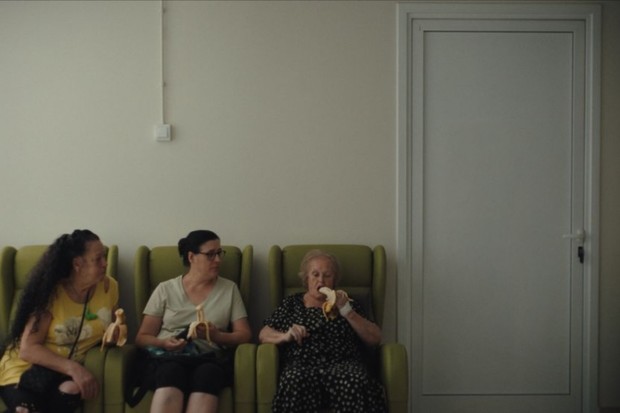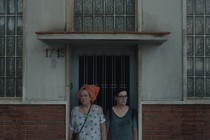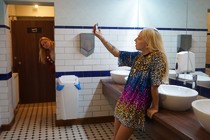Review: The Permanent Picture
by Júlia Olmo
- Laura Ferrés presents an original and free film, somewhere between dark comedy and costumbrista drama

In one of the first scenes of The Permanent Picture [+see also:
trailer
interview: Laura Ferrés
film profile], Laura Ferrés’ debut film, two women discuss how they have never seen the sea. "I think it must be peaceful and scary," says one of them. "Scary?" her friend asks. To which the other responds, "Yes, because you can't see what's at the bottom." Easily overlooked, the scene reveals the essence of the film, the mystery that is in all of us, because as the friend concludes, that bottom that we cannot see does not only happen with the sea.
The film, written together with Carlos Vermut and Ulises Porra and presented in competition at Locarno Film Festival, tells the story of two women who end up meeting each other. Carmen, who lives on the outskirts of Barcelona, works as a casting director at an advertising agency and has to find a "normal" person for a political campaign. During this search, she meets Antonia, a street vendor with whom she ends up establishing a unique relationship where it will be revealed that they share much more than meets the eye. From this plot, the film talks openly and suggestively about the hidden side in all of us, what faces say and don't say about people, the impossibility of knowing the other, the strangeness of the bonds we create and lose throughout life, the desire to love and be loved, the weight of the past on the present, loneliness, the images that remain with us.
The issues raised by the film are interesting, but what makes it different is how it does so. The story is told in a veiled way, like a puzzle, so that the audience can put the pieces together and fill in the gaps that the director has not wanted to complete. Through the symbolic power of images, she refers to these ideas of solitude, strangeness, darkness, mystery, the extraordinary in the ordinary. A karaoke where we can forget who we are, two boats that cross paths never to meet again, an empty room that was once inhabited, two women swimming in the sea, faces of people who never existed, a ghost face in a photo, two images that overlap; objects, places and captures of life that freely conjure these questions.
All this is told with imagination, suggestion and a particular, sharp, black and dry humour. Although at times it may seem that there is an overly forced search for bewilderment, this search is coherent with the backstory, with the disturbance produced by the contrast between the weight and the absurdity of the ordinary. María Luengo and Rosario Ortega (the new actresses who star in the film) give truth to the tone of the film, between the dark, the funny and the tender, and to the humanity of its characters.
The Permanent Picture is a film with personality, a strange beauty, different from other films of loss and reuniting that have been seen a thousand times before. Its greatest asset lies in the originality and freedom with which Ferrés dares to tell her story of love and loneliness.
The Permanent Picture is a production between the Spanish companies Fasten Films and Materia Cinema and the French company Le Bureau, supported by TV3, sold internationally by Be for Films and distributed in Spain by La Aventura.
(Translated from Spanish by Vicky York)
Did you enjoy reading this article? Please subscribe to our newsletter to receive more stories like this directly in your inbox.























